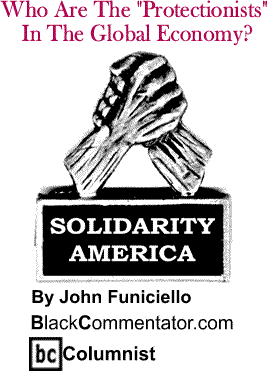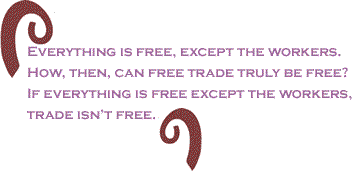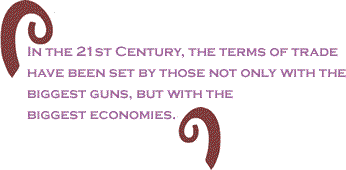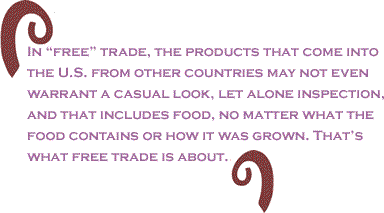
|
|||||||||||||||||||||||

|
|

Custom Search
|
|
 |
|
| There never has been really free trade. We’re told by our government, its politicians, and Corporate America that there is such a thing as “free trade” and we have to do everything in our power to protect the “free” part in our new global enterprise. We’re also told that, if we question the purposes or structure of the global economy, we’re threatening the free trade that has developed in recent decades. Trade won’t be as free, if we start to set any limits on the transnational corporations that seem to rule the world. Ever since humans have been able to shoulder a pack and walk long distances, ever since they have loaded a beast of burden with goods, and ever since a dugout canoe or sailing ship could reach other peoples, there has been trade. That never would change. We always would have trade in that sense. But, there came a time when trade was taken over by kings, armies, and trading companies. Since then, the terms of trade have been set by those with the biggest guns. In that sense, there never has been truly free trade. In the 21st Century, the terms of trade have been set by those not only with the biggest guns, but with the biggest economies. There are “instruments” of trade and foreign policy that are just as good—even better—than the size of the guns. They include the World Bank and the International Monetary Fund (IMF). However, they alone don’t ensure that large profits will be made by the corporations that sit astride the world. There are other things and they protect the efforts of the companies that go forth into the world to engage in “free” trade.
A brief look at some of the things that protect the profits that come into the country reveals that they are from multiple sources and are things that pass across national frontiers easily—usually, without a hitch and possibly without even a cursory inspection.
Elaborate structures like the IMF and the World Bank have been set up, so that what is done in developing countries always will appear to be business as usual.
And, these structures long ago became functions of the government that, for many years, have been viewed—along with many national and international aid programs to assist in the “development” of poorer nations—as the silent partners of corporations that spread out across the globe to bring their fortunes back to the homeland.
As a people, we protect the rights of the global entrepreneurs to make profits. It’s protectionism, but it’s the kind that is acceptable to the powers-that-be. For decades, these corporations have sought the lowest-wage countries to relocate their plants and factories. The people have had to accept as little as 2 percent of the pay of American workers, while their own country’s resources and even cultures have been used up or altered forever. Unions and progressive organizations have pointed out over many years that workers rights—human rights—are not being respected. They point out, too, that ongoing damage to the environment of the host nation is ignored. But these are the kinds of issues that are derided as “protectionism,” an effort to bring the jobs back to America or level the playing field to encourage companies to keep the jobs at home. The question is who are the greater protectionists? Are they those who provide everything for free to the corporations or those who fight to raise the standards of working men and women everywhere? Chances are that you will find the “rights” people hooted off the stage by big investors, politicians, people who live on stock coupons, and the punditry. Everything is free, except the workers. How, then, can free trade truly be free? If everything is free except the workers, trade isn’t free. Trade will only be free when the workers in the nations that are party to a trade agreement can choose the country in which they will make their living. If the people—the workers—are not free to move among the countries that are signatories to a given trade agreement, then it’s not a free trade agreement. It must be called something else. And the idea of protectionism as an epithet against those who strive for freedom and equality for the people needs to die the death that it long ago deserved. Then again, maybe this is all a moot point, since the economic meltdown that the world is experiencing may change everything, to the extent that much of what we have become accustomed to will have to be rebuilt and the people will have a chance to build it in a form that serves the needs of all the people, rather than filling the counting houses of the few. We’ll see. BlackCommentator.com Columnist, John Funiciello, is a labor organizer and former union organizer.
His union work started when he became a local president of The Newspaper
Guild in the early 1970s. He was a reporter for 14 years for newspapers
in |
|
Any BlackCommentator.com article may be re-printed so long as it is re-printed in its entirety and full credit given to the author and www.BlackCommentator.com. If the re-print is on the Internet we additionally request a link back to the original piece on our Website. Your comments are always welcome. eMail re-print notice
If you send us an eMail message we may publish all or part of it, unless you tell us it is not for publication. You may also request that we withhold your name. Thank you very much for your readership. |
|
| |
|
| April
9 , 2009 Issue 319 |
|
| Executive Editor: Bill Fletcher, Jr. |
| Managing Editor: Nancy Littlefield |
| Publisher: Peter Gamble |
| Est. April 5, 2002 |
Printer Friendly Version
in resizeable plain
text format or pdf
format. |
| Frequently Asked Questions |
 |

|
 |
 |
 |
| |
| |





































